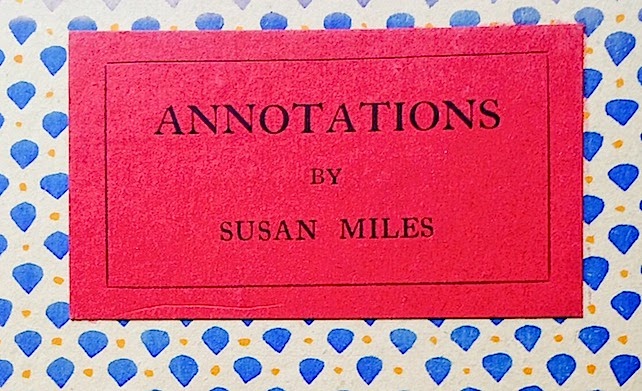Thursday, October 30, 2014
Mornington Crescent - the poem
Found - a slim volume of poetry called Annotations (London: Humphrey Milford, 1922) by 'Susan Miles'' (i.e. Ursula Wyie Roberts 1887-1975 feminist, suffragist and poet). She wrote a pamphlet in 1912 The Cause of Purity and Women's Suffrage. This copy is signed in 1960 to Russell and Letitia Sedgwick. The poem's title is taken from the famous tube station (and later the humorous improvisational radio game) Mornington Crescent. It is slightly reminiscent in sentiment and setting of Ezra Pound's earlier imagist haiku of 1919 In a Station of the Metro - 'The apparition of these faces in the crowd;/ Petals on a wet, black bough.' Persephone recently republished Susan Miles's Lettice Delmer, a novel in verse, which had first appeared in 1958. ‘Its simplicities are at a profound level. The theme is a great one and the characters are superb,’ wrote Storm Jameson. Her poetry was also anthologised in the 1920s by poetaster Harold Monro, said to be a hard man to please when it came to poetry...
MORNINGTON CRESCENT
HOMELY-FEATURED little daughter in the Tube,
Homely-featured mother,
Why have you turned for me this criss-cross world
Into a place of beauty
And of peace?
You have not spoken;
You have just sat there
Silent.
Your four grey eyes
Are four grey pools of unplumbed joy.
They are not ruffled by any controversy;
They are stirred by no apprehension.
Now and again your lovely and equable eyes
Have met.
You have smiled quiet, radiant smiles,
And you have fallen back
On to a new space of repose
And of settled, deep-grounded confidence,
Mother in daughter,
Daughter in mother.
Your glad serenity,
And your placidity
Have soothed and shamed me.
I will be less niggard in love henceforth
Because of you.
I will be less bitter and less torn,
I will be less heated by desire,
Less fretted, less violent, less unstable,
Mother, because of you,
Daughter, because of you.
Because of the pools of peace
Within your grey eyes,
I will be less virulent,
Less acid,
Less vituperative.
Subscribe to:
Post Comments (Atom)



"poetaster Harold Monro, "
ReplyDeleteNo, not a poetaster. Monro was undoubtedly a minor poet, but a genuine poet for all that.
You're not wrong Roger. I guess I just like the sound of the word (almost always vaguely derogatory?) HM was a full blown poet. N
ReplyDelete